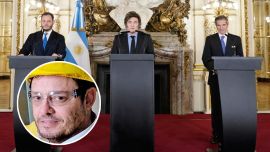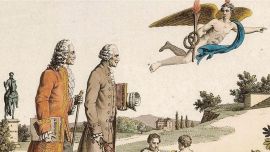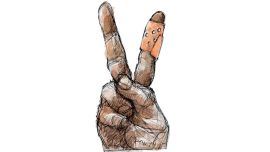In some countries, among them the United Kingdom, a minor financial misdemeanour can be more than enough to put an abrupt end to a promising political career. In other nations, such as Argentina, getting caught stealing millions, even billions of dollars from the public purse may, at most, have an adverse effect on one’s poll rating. Despite being plausibly accused of turning the government she, along with her husband until his premature death, led into a highly successful mafialike organisation which, while in business, managed to rake in a huge amount of money, Cristina Fernández de Kirchner remains one of the country’s most influential politicians.
Just why between a quarter and a third of the electorate would like to see her return to her old haunt is not that easy to understand. Did most of them feel better off back then and think her mere presence in the Pink House would make their lives easier? In some cases, it could be. Do they miss all those televised lectures she delivered when she was in the mood? That seems improbable. So too does the notion that, unlike other politicians, she is blessed with plenty of charisma. Or is it that, while few people really like her, a great many feel they have the same enemies? Whatever it is, so far it has kept her out of jail, so it must be something important.
To justify their continued support for Cristina, loyal Kirchnerites must either brush aside the charges that have been levelled against her by attributing them to a malignant campaign of lies or “fake news,” concocted by her political foes and the journalistic hacks who are in their pay, or insist that, while she and her husband may have been a bit light-fingered on occasion, so too have been most of their enemies including, needless to say, Mauricio Macri.
The majority prefer the second approach. They are doing what they can to blacken the names of those out to get her because they know that the hard evidence against Cristina is so overwhelming no sane person could possibly believe it was all cooked up by a sinister cabal.
In other parts of the world in which large-scale corruption has always been endemic, people who, not that long ago, were every bit as powerful and popular as Cristina are already behind bars or soon will be. Though the charges made against Brazil’s former president Luiz Inácio Lula da Silva were laughable in comparison with those she faces, it would seem that in his country both the judges and the politicians are made of sterner stuff than happens to be the case here. The same can be said of Malaysia, where the former prime minister, Najib Razak, looks likely to spend the rest of his days in jail for his role in a banking scandal in which a cool US$10 billion or so went missing.
The mere fact that Cristina is not only still at large but can also dream of returning to the Pink House (it may be a long shot, but it is at least conceivable and is having a negative effect on the economy) raises questions that most people would rather overlook. Among other things, it suggests that Argentina is a country in which the rule of law is no more than a misty ideal because key members of the political class, who eagerly tell us how much honesty and stuff like that matter to them, have no intention of taking their own pronouncements literally.
By refusing to strip the former president of her parliamentary privileges so she can be handed over to her would-be jailors, people like Senator Miguel Ángel Pichetto are making it clear that, as far as they are concerned, the interests of the corporation they belong to outweigh everything else. They must also fear that if someone as influential as Cristina can be deprived of her freedom because she broke the law, many others could soon suffer a similar fate. After all, in societies in which corruption has long been ubiquitous, even politicians who never stole a paper clip can be accused of turning a blind eye to the behaviour of less scrupulous fellow party members.
The part being played in this unedifying drama by Cristina’s successor, President Macri, is widely seen as ambiguous. Many assume he is determined to keep her politically alive because it suits him to run against a rival whose image has become, shall we say, slightly shop-soiled, even if it is still considerably brighter than those of other Peronists who, were one of them to get the support of most of the movement’s warring factions, could cause him a great deal of trouble in the coming months.
To defend his hands-off approach, Macri swears that he sincerely believes the Judiciary should not be subjected to political pressures, but, the country’s traditions in this area being what they are, hardly anyone takes such protestations seriously. As Macri himself must be well aware, the judicial fraternity is notorious for taking into account the direction in which the political winds are blowing. This is why for long periods cases involving corruption get shelved until the skies finally clear, but if the signals coming from the Pink House seem encouraging, judges suddenly become hyperactive and start competing with their fellows to see which of them can nail a high-profile villain.
The main beneficiaries of the resulting scepticism are the many politicians and their cronies who over the years have supplemented the by no means despicable income they were entitled to with the little extras that somehow or other came their way. Few can have gone so far in this respect as Mr and Mrs Kirchner and their retainers, but in their trade honesty is so unusual that politicians who do not get rich while in office are remembered with alleged affection as saintly characters who were an example to us all.
The frequency with which the name of the late Arturo Illia,
who died in 1983 and was president in the mid-1960s, continues
to crop up when people try to name at least one honest politician,
tells us all we need to know about this. No doubt there have been
many who were just as law-abiding and self-sacrificing as Illia,
but the consensus is that most top Argentines would find it desperately hard to survive unscathed a thoroughgoing investigation of their financial affairs. related news





















Comments